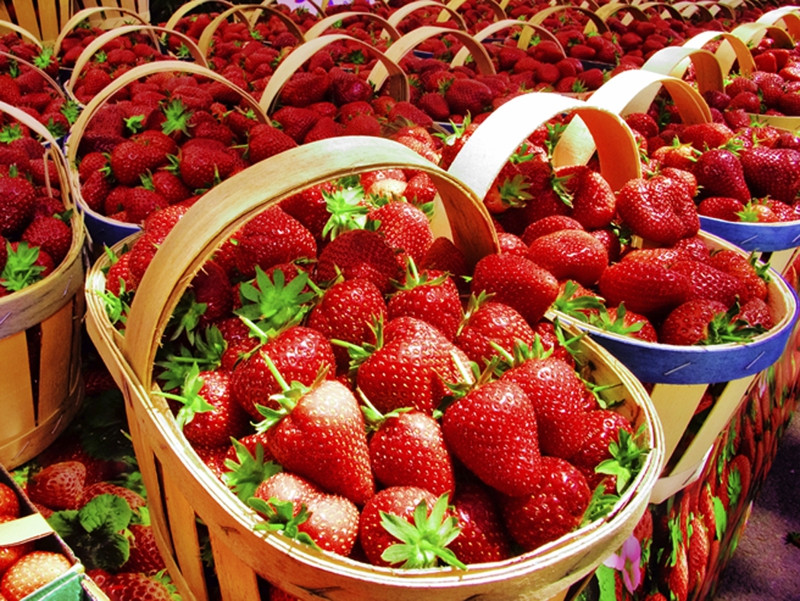Farm-to-Table: Difference between revisions
Siterunner (talk | contribs) No edit summary |
Siterunner (talk | contribs) No edit summary |
||
| Line 22: | Line 22: | ||
'Nuff said. | 'Nuff said. | ||
SJS/Your Siterunner | |||
Revision as of 14:17, 17 April 2015
The Farm-to-Table Movement
Tags: Alternative Agriculture; Organic Food; Local Food Production; Sustainable; 'Slow Food'; 'Four-Star' Restaurants; "Peak of the Season"; Wellness
Back in the early 1990's, when I was working with Seeds of Change and its pioneering ('Bioneering') publishing efforts to create and spread the biodiversity and organic/heirloom importance of seed saving/co-evolution/fresh, healthy and tasty food production, I often would use a phrase that captured what was, to me, the key to a 'Chez Panisse-style', green alternative to 'Big Ag' with its industrial-size production methods and behind-the-scenes petrochemical fertilizer regime with pesticides/herbicides/miticides/fungicides and varied health-threatening inputs.
We chose to challenge the prevailing conventional agriculture/conventional store/conventional restaurant/conventional home kitchen model -- and over the past 20 years much has changed -- and much has changed for the better.
In the early- and mid-90s the phrase I felt was right as we produced our books and tours, conferences and events, and spread the message, was "peak of the season", so I'm adding it again to GreenPolicy360.
The notion of "peak of the season" is a choice, choosing what is best in the garden, in the fields, a choice that is made in a co-evolutionary sense between we humans and our natural 'co-traveling' species.
In a peak-of-the-season way of going, we consciously choose to harvest and eat, farm-to-table, what is best in the fields, a choice that should include seed-saving, choosing what are the best seeds (allowing the healthiest, most undamaged-by-insects, flourishing varieties of crops 'go to seed' and saving these seeds)... You choose what to carry forward for the next generation planting (and/or buy/trade heirloom seeds) --- and you harvest the best of the rest of the crops at the 'right time'. This enables growers and buyers to a sustainable "Farm-to-Table" that flourishes.
A 'natural' method is involved in market gardening/farmers markets/CSA/Alt Ag and/or "farm-to-table" production. What arrives at your kitchen or the kitchen of your favorite restaurant is fresh, chosen, and via your own choice (not the industrial producers choice and the grocery chain or restaurant wholesaler distributor's choice). You are choosing Peak of the season (not choosing what's arrayed in rows, sprayed and waxed, in industrial-sized lots, at your local big-box grocery store.)
Although there are exceptional chain-grocers in the US (Whole Foods, Sprouts, Wild Oats, Trader Joe's) and organic-natural-health-food stores, the best way to go is for you, yourself (and not rely on your grocery store's buyer), to choose what's the best for you and your family.
I'll give you one example of my love of the phrase "Peak of the Season."
The central Florida Strawberry festival season. Next comes the Blueberry season!
'Nuff said.
SJS/Your Siterunner
○ ○ ○ ○ ○ ○ ○ ○ ○ ○ ○ ○
Farm-to-Table/Resources
- Feb 2015 - LA Times / Op-Ed / The food movement has only just begun
The mission for everyone who cares about food — even if you raise chickens or garden tomatoes, can barrel-aged hot sauce, or brew pale ale — should be to buy local. And then buy some more, regularly, every week, month and year. With enough momentum and time, consumer demand may bring on the substantial infrastructure and policy changes that small family farms need to truly thrive...
Just the other day, I heard from the organic farmer that he'd pulled together enough money from his city relatives to make his February payment and fend off foreclosure. Why? Because farming good food has never been as valued in the greater culture as it is today, and it motivated them to preserve their family's tradition of working the land.
Herein lies the promise. But it's much too soon to declare farm-to-table “been there, done that.” Far from being cliche, the food movement — at least for the people who labor so we can all eat better — has only just begun.
○ ○ ○ ○
